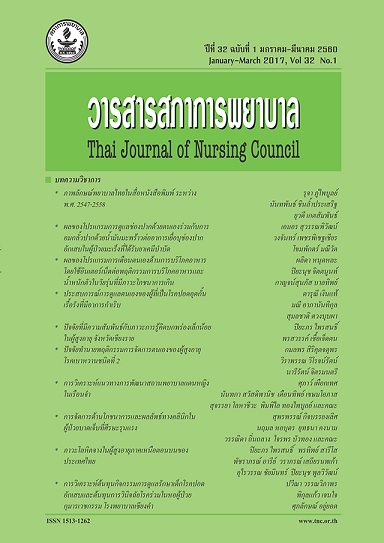การจัดการด้านโภชนาการและผลลัพธ์ทางคลินิกในผู้ป่วยบาดเจ็บที่ศีรษะรุนแรง;Nutritional Management and Clinical Outcomes of Patients with Severe Traumatic Brain Injury at Vachira Phuket Hospital
Keywords:
บาดเจ็บที่ศีรษะรุนแรง, การจัดการด้านโภชนาการ, Traumatic brain injury, Nutritional ManagementAbstract
วัตถุประสงค์: เพื่อศึกษาผลการจัดการด้านโภชนาการในผู้ป่วยบาดเจ็บที่ศีรษะรุนแรงและเปรียบเทียบผลลัพธ์ทางคลินิกระหว่างกลุ่มทดลองที่ได้รับการจัดการด้านโภชนาการและกลุ่มที่ได้รับการพยาบาลแบบปกติ
การออกแบบวิจัย: การวิจัยกึ่งทดลอง 2 กลุ่มที่เป็นอิสระจากกัน
การดำเนินการวิจัย: กลุ่มตัวอย่าง 50 คน เป็นผู้ป่วยบาดเจ็บที่ศีรษะรุนแรง อายุ 18 ปีขึ้นไป มี GCS <8 คะแนน แบ่งเป็น 2 กลุ่ม ๆ ละ 25 คน กลุ่มควบคุมได้รับการพยาบาลแบบปกติ กลุ่มทดลองได้รับการจัดการด้านโภชนาการ ประกอบด้วย การประเมินภาวะเสี่ยงทางโภชนาการ การเริ่มให้อาหารปั่นสูตรพิเศษทางทางเดินอาหาร ภายใน 24-48 ชั่วโมง การคำนวณพลังงานเป้าหมายและพลังงานที่ได้รับแต่ละวัน และการเตือนแพทย์เพื่อการจัดการโภชนาการที่เหมาะสม วิเคราะห์ข้อมูลทั่วไปด้วยสถิติบรรยาย และเปรียบเทียบผลลัพธ์ทางคลินิกด้วยสถิติอ้างอิงพาราเมตริกหรือนอน-พาราเมตริกตามลักษณะของชุดข้อมูล
ผลการวิจัย: กลุ่มทดลองเริ่มให้อาหารทางสายยางหลังจากการรักษาตัวในโรงพยาบาลเร็วกว่ากลุ่มควบคุมอย่างมีนัยสำคัญ (Md = 33 ชั่วโมง, IQR = 27; Md = 46 ชั่วโมง, IQR = 38, ตามลำดับ; Z =
-2.26, p < .05) กลุ่มทดลองได้รับพลังงานถึงเป้าหมายเร็วกว่ากลุ่มควบคุมอย่างมีนัยสำคัญ (Md = วันที่ 6, IQR = 5, และ Md = วันที่ 10.5 IQR = 8, ตามลำดับ; Z = -2.20, p. < .05) และมีจำนวนผู้ป่วยที่ได้รับพลังงานถึงเป้าหมายภายใน 7 วันมากกว่ากลุ่มควบคุม ( 2= 13.23, p < .001) ด้านผลลัพธ์ทางคลินิก พบว่า อัตราการตายของกลุ่มทดลอง (ไม่มี) ต่ำกว่ากลุ่มควบคุม (ร้อยละ 16) ( 2= 4.39, p < .05) ส่วนด้านคะแนน GCS จำนวนวันที่ใช้เครื่องช่วยหายใจ จำนวนวันนอนโรงพยาบาล และการติดเชื้อตำแหน่งต่าง ๆ ไม่พบความแตกต่างอย่างมีนัยสำคัญทางสถิติระหว่างสองกลุ่ม ส่วนระดับอัลบูมินในเลือดของกลุ่มทดลองพบว่าไม่มีความแตกต่างกันอย่างมีนัยสำคัญในวันที่ 1, 7 และ 14ของกลุ่มทดลองไม่พบความแตกต่างกันอย่างมีนัยสำคัญ
ข้อเสนอแนะ: การจัดการด้านโภชนาการส่งผลดีต่อผลลัพธ์ผู้ป่วยบาดเจ็บที่ศีรษะรุนแรง แต่ควรมีการติดตามอย่างต่อเนื่องในระยะยาวต่อไป
Objective: To study clinical outcomes of a nutritional management programme for severe traumatic brain injury patients and compare the clinical outcomes in the patients receiving the nutritional programme with those in the patients receiving standard care.
Design: Experimental study conducted on two independent groups.
Procedure: The sample consisted of 50 severe trauma brain injury patients with ≤8 GCS points. The patients were equally divided into a control group and an experimental group. The control group received standard care. The exerimental group, on the other hand,participated in the nutritional management programme incorporating (1) nutritional riskassessment; (2) enteral feeding with a blenderised diet within 24 to 48 hours; (3) calculation
of daily caloric intake goals and actual caloric intake; and (4) a reminder for the physicians regarding proper nutritional management. The data were analysed using descriptive statistics.The comparison of clinical outcomes was done using parametric or non-parametric referential statistics, depending on the data sets.
Results: First, the experimental group was ready for post-discharge enteral feeding signifcantly earlier than the control group (p < .05). Next, the experimental group achieved their daily caloric intake goals in a signifcantly shorter time than the control group (p < .05). Also, more members of the experimental group than of the control group achieved their daily caloric intake goals within 7 days or fewer (p < .001). In terms of clinical outcomes, the experimental group displayed a signifcantly lower mortality rate than the control group (p < .05). However, no signifcant differences in the GCS scores, the number of days of artifcial respiration dependence, the number of days of hospitalisation, and the infection of organs were found between the two groups. No signifcant
differences in the blood albumin levels, measured on the 1st, 7th and 14th days, were detected
amongst the experimental group members.
Recommendations: This nutritional management programme contributed to the
improvement of severe traumatic brain injury patients’ condition. However, an on-going
long-term monitoring system is recommended to ensure greater effcacy








